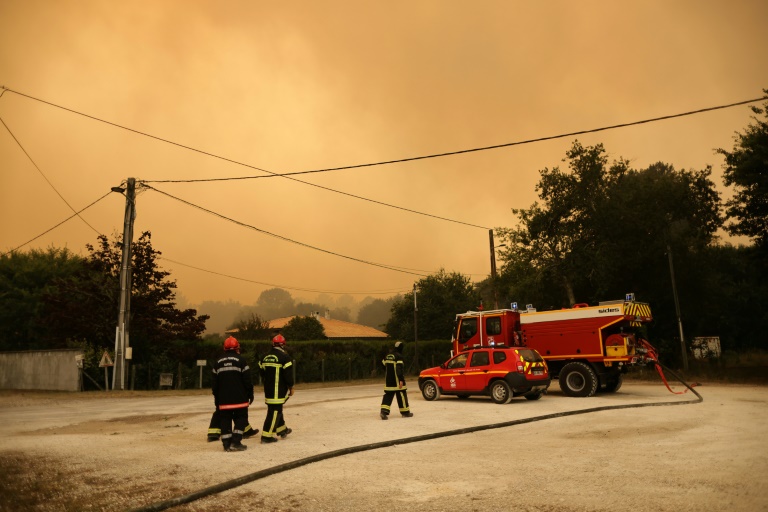A heatwave sweeping across southwestern Europe peaked on Thursday in Spain, with scorching temperatures fuelling stubborn wildfires that ravaged several countries.
Temperatures soared in Greece, Spain and Portugal, while the heatwave was expected to continue in Britain and France into next week.
It is the second heatwave to hit the region in a matter of weeks, as scientists say they are becoming more frequent and intense due to climate change.
The mass of hot air pushed temperatures into the mid-40 degrees Celsius in parts of Spain again for the second day in a row.
The mercury hit 45 degrees Celsius (113 degrees Fahrenheit) at 5 pm (1500 GMT) near the central city of Avila as the suffocating temperatures continued.
On Wednesday, the city of Almonte in the southern region of Andalusia recorded Spain’s highest temperature that day — 45.6C.
Spain’s state meteorological agency AEMET said it expects temperatures to ease slightly on Friday in some parts of the country, although it predicts the heatwave will continue “at least” until Monday.
The health ministry told people to drink plenty of fluids, wear light clothes and stay in the shade or air-conditioning.
It also recommended people avoid caffeine and alcohol and reduce “intense” physical activity outdoors during the hottest hours.
– ‘Major’ fires –
A fire in Spain which started in the eastern region of Extremadura on Monday has so far ravaged at least 4,000 hectares of land, local officials said.
Between January 1 and July 3, more than 70,300 hectares of forest have gone up in smoke in Spain, the government has said — almost double the average of the past 10 years.
Italy, Croatia, France and Portugal all reported forest fires linked to the heat this week.
In Greece, a helicopter helping to fight a forest fire on the island of Samos on Wednesday crashed into the Aegean Sea, killing two of its four crew members, the coastguard said Thursday.
The fire continued to burn on Thursday, fanned by strong winds.
In Portugal, over 2,000 firefighters were battling dozens of wildfires across Portugal, including four deemed “major”.
One person died in a forest blaze, authorities said Wednesday, after a body was found in a burned area in the northern region of Aveiro.
Around 60 others have been injured, some 860 people evacuated and roughly 60 homes destroyed or damaged.
Portuguese Prime Minister Antonio Costa earlier warned that Thursday would be the “most serious” day of the heat wave because temperatures were expected to rise and winds were stronger.
“Today is the day where we have to be the most careful,” he said.
In June, 96 percent of Portugal was classified as being in either “extreme” or “severe” drought.
– French evacuations –
Meteorological services in France also warned the situation would “become intense between Sunday and Tuesday” — possibly exceeding 40C before dipping by Wednesday.
Although temperatures eased by a few degrees Celsius across France, two large wildfires continued in the Gironde region near the southwestern city of Bordeaux, destroying 4,200 hectares of forest in three days, with firefighters still unable Thursday to stop the blazes.
Some 4,000 people, including residents of a military base, were evacuated on Thursday as a precaution because of the risk from the smoke from the fire, local officials said.
Tourist magnet the Dune de Pilat, Europe’s highest sand dune, was closed to visitors after several thousands were evacuated from campsites this week.
“The situation is stable, but not yet under control,” the region’s authorities said Thursday as temperatures were forecast to hit 38C.
However, no additional evacuation of residents was planned, after hundreds were moved from their homes in recent days as a precaution in the region.
Further south, the Landes region and the city of Nimes cancelled all fireworks for Bastille Day, France’s national holiday.
Temperatures were expected to reach 36C in southern France, 25C in the north of the country, and 32C in Paris on Thursday.
London meanwhile has issued an “amber” alert — the second highest of three levels — while one UK climate official said there was a chance Britain’s highest temperature — 38.7C recorded on July 25, 2019 in Cambridge — could be surpassed.
London mayor Sadiq Khan announced an emergency plan to help homeless people deal with the extreme heat that includes distributing water and suntan lotion.









